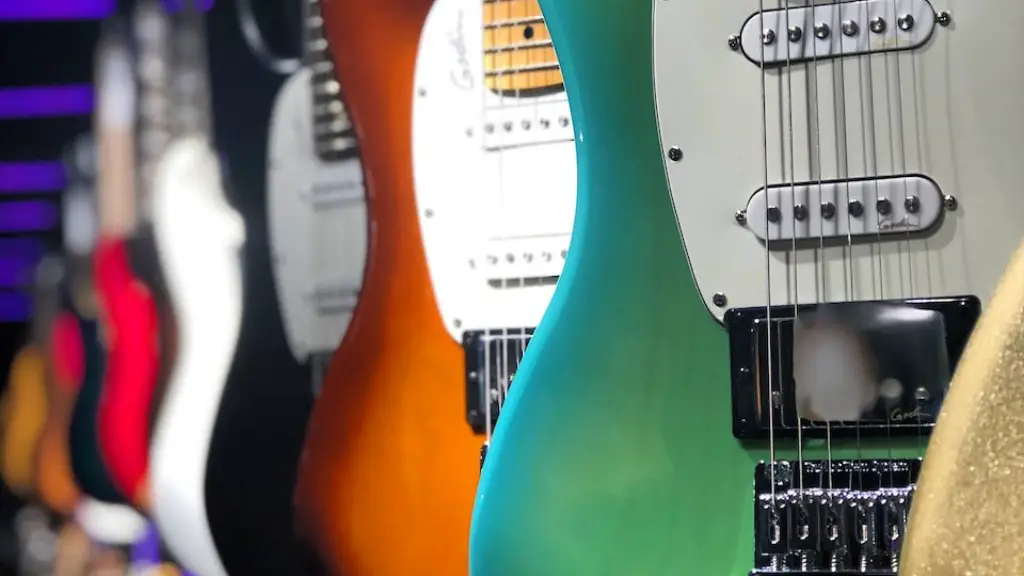Choosing the right electric guitar strings for your instrument can make a huge difference in its sound and playability. Whether you are a beginner or an experienced musician, finding strings that fit your needs can be difficult.
When selecting electric guitar strings, it is important to consider the type of music you play and the tuning you use. Different types of strings will produce different tones and have different tensions. It is also important to consider the gauge of the string, which affects the overall sound.
To get started, it is a good idea to research different types of strings and try different brands. Many guitarists prefer certain brands over others, so it is important to experiment and find what works best for you. Once you have found a set that works for your playing style, stick with it!
Finding the right electric guitar strings can be a daunting task, but with some research and experimentation, you’ll be sure to find a set that suits your playing style and sounds great. Don’t forget to change your strings regularly!
Factors to Consider When Buying Guitar Strings
When purchasing guitar strings for your electric guitar, there are several factors to consider. One of the most important is the type of string: whether it’s a coated string, an uncoated string, or a hybrid set. Coated strings offer enhanced corrosion resistance and longer life, while uncoated strings provide a more traditional feel and tone. Hybrid sets combine both types of strings to provide a unique combination of bright tones and long life.
The gauge is also important when choosing strings; lighter gauges are easier on the fingers but have less volume, while heavier gauges provide more power and sound but require more effort to play. It’s important to find the right balance between tension and playability that works for you. Additionally, the material used in the string construction can affect its tonal quality; nickel-wound strings bring out brighter tones while steel-wound strings produce fuller sounds.
Finally, cost is an important factor when shopping for guitar strings. While higher price tags often indicate higher quality materials and construction, there are many affordable options available that offer excellent performance at reasonable prices. Ultimately, when selecting guitar strings it’s important to consider these factors as well as how they will fit your playing style and budget in order to make the best decision for you.
Selecting the Right Electric Guitar Strings
Guitar strings are a fundamental part of your sound. Picking the right gauge of string for your guitar can make all the difference in your playing. The gauge is measured in thousandths of an inch, and each gauge has its own tone and feel. A light gauge is easier to play but produces less volume and sustain, while a heavier set will produce more volume but can be harder to play. To find the right balance, consider your playing style and what type of sound you’re looking for.
For example, if you prefer a more mellow tone with less attack, try a lighter gauge string. If you want a brighter sound with more sustain, opt for a heavier set. It’s also important to consider the neck profile of your guitar as well as pickup type when deciding on strings. Single-coil pickups tend to work better with lighter strings while humbuckers favor a thicker set. Regardless of what type of guitar you have, experimenting with different gauges is the best way to find out what works best for you.
Different Brands of Electric Guitar Strings
When it comes to choosing electric guitar strings, there’s no shortage of options. From classic brands like Fender and Ernie Ball to more modern offerings from D’Addario and Elixir, there’s something for every player. Fender offers classic nickel-wound strings in a variety of gauges, while Ernie Ball has a wide selection of extra-light, light, and medium strings for all playing styles. D’Addario has coated strings for increased durability and Elixir’s Nanoweb strings offer superior tone and longevity.
If you’re looking for a more custom sound, consider trying out some flatwound or half-round strings. Flatwounds are great for vintage tones, while half-rounds offer a unique feel that is good for jazz and blues. There are also specialty sets available from companies like DR Strings, GHS Boomers, and Rotosound that offer unique sound combinations that range from bright highs to warm lows.
No matter what style of electric guitar string you choose, the most important factor is finding the set that fits your playing style and instrument best. Experimenting with different brands can help you find the perfect match to give your guitar the sound you’ve been searching for.
Electric Guitar Strings
Electric guitar strings are an essential component of any setup. They come in a variety of materials, each with their own unique properties and sound qualities. The most common materials used for electric guitar strings are nickel-plated steel, stainless steel, and phosphor bronze. Nickel-plated steel strings are the most popular option and give a bright, crisp tone. Stainless steel strings provide a brighter sound than nickel-plated steel and have better intonation and sustain. Phosphor bronze strings give a warm, mellow sound with great depth. No matter what type of sound you’re looking for, there is likely an electric guitar string set that can help you achieve it.
When choosing electric guitar strings, be sure to consider the gauge or thickness of the string as well as the material it’s made from. Heavier gauges provide more tension for heavier styles of playing while lighter gauges are better for fingerpicking or blues styles. Different materials can also affect the overall feel of your playing experience, so consider your style of playing when making a selection. With so many choices available, you’re sure to find the perfect set of electric guitar strings for your needs!
Advantages and Disadvantages of Different Types of Materials Used in Making Electric Guitar Strings
Electric guitar strings come in a variety of materials, each with its own advantages and disadvantages. Nickel-plated steel strings have a bright, long-lasting tone, but can be slightly harder on the fingers. Pure nickel strings are softer on the fingers, but tend to produce a softer sound. Stainless steel strings have bright highs and big lows, but they can be difficult to bend. Phosphor bronze strings are great for acoustic guitars, but they don’t last as long as other materials.
For electric guitars, some of the most popular choices are Cobalt, Titanium or Hybrid strings. Cobalt strings have a deep powerful tone that lasts longer than other types of metal string sets. Titanium strings offer quick playability with a bright sound that cuts through the mix easily. Hybrid string sets combine two different materials for maximum tonal versatility.
No matter which type of string you choose, it’s important to find one that suits your playing style and tastes best. So take your time trying out different options until you find the perfect set for you.
Maintenance Tips for Electric Guitar Strings
Maintaining your electric guitar strings is important for achieving the best performance and sound. To ensure the strings last and sound their best, regularly wipe down your strings with a cloth after playing. This will help remove residue from sweat and oils from your hands that can corrode the strings. You can also apply some guitar string cleaner or lubricant to keep them in top condition. Additionally, it is important to change your strings regularly, as old or worn out strings won’t give you the same sound quality as fresh ones. When buying new electric guitar strings, consider factors such as the gauge and material of string (nickel-plated steel, stainless steel) to find the right one for your instrument.
Finally, be sure to tune your guitar regularly. A well-tuned instrument will make a big difference in how it sounds and plays – and help keep your electric guitar strings in good condition too!
Closing Words
When it comes to buying electric guitar strings, it’s important to find the right type for your particular guitar and playing style. Strings come in a variety of materials, gauges, and coatings that each provide their own unique benefits. Additionally, different string brands may also have their own special features. Ultimately, the best strings for you are the ones that provide the sound and feel you prefer. With so many options available, make sure to experiment with different combinations in order to find the perfect set of strings for your instrument.





